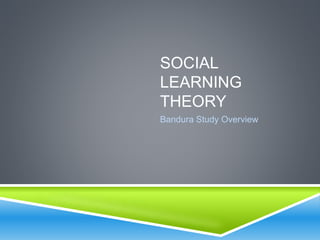
Social learning theory power point
- 2. LEARNING OUTCOME Explain Social Learning Theory, making reference to two relevant studies. Explain: Give a detailed account including reasons or causes.
- 3. NORM A set of rules based on socially or culturally shared beliefs of how an individual ought to behave.
- 4. SHOPPING NORMS What are a few of the norms when standing in the Check-Out line? What do you do and what don’t you do? How did you learn these rules?
- 5. SOCIAL LEARNING THEORY Proposed by Albert Bandura SLT states that humans learn behavior through observational learning – watching models and imitating their behavior. Direct Impact – The modeler is trying to change behavior of the observer Indirect Impact – The modeler is not trying to change the behavior of the observer
- 6. IN ORDER FOR SLT TO OCCUR THERE MUST BE … Attention: Pay attention to the Model Retention: Remember the Model’s action Motor Reproduction: Copy the Model’s action Motivation: Want to demonstrate what they have learned
- 7. MOTIVATING FACTORS IN SLT Give an example of this type of learning in the real world Consistency: If the model behaves in a way that is consistent across situation- always being brave- then the observer will be more likely to imitate their behavior than if the model behaves differently depending on the situation. Identification with the Model: There is a tendency to imitate models who are like ourselves. (Age, Gender, Etc.) Rewards/Punishments: Bandura argues that people can learn from observing the consequences of others; they don't need to experience those consequences themselves. This called vicarious reinforcement and happens when we watch what happens to others around us. Liking the Model: Warm and friendly models (or ones that we like nonetheless) are more likely to be imitated than cold, uncaring models. A study (Yarrow et al. (1970)) found that children learn altruistic (helpful) behaviors better from people who they had developed warm relationships than from strangers.
- 8. BANDURA ET AL. (1961) THE BOBO DOLL EXPERIMENT Bandura on the Bobo Doll Study
- 9. BANDURA ET AL. (1961) Aim: To discover if children would imitate aggressive behavior modeled by adults; Also, to know if children were more likely to imitate same-sex models. Method: Participants: 72 Children (3-6 Years Old) Treatment Group 1: Observed an adult model playing violently with a Bobo Doll. Treatment Group 2: Observed a model assembling toys for 10 minutes. (Non-Violent) Control: Did not Observe a Model
- 10. BANDURA ET AL. (1961) Findings: Children were significantly more aggressive (and in novel ways) when they had observed a violent model. Children were more likely to imitate same-sex models. Conclusion: Children can learn aggressive behavior based on social observations Social Learning Theory Criticisms: Ecological Validity? Others?
- 11. MONKEY SEE, MONKEY DO! Vervet Monkeys using Social Learning
- 12. VAN DE WAAL ET AL. (2014) Aim: To determine the circumstances and models that shape social learning. Method: Field Observation of wild Vervet Monkeys Placed sandy grapes in the field and observed the strategies that the monkeys would use to eat the grapes.
- 13. VAN DE WAAL ET AL. (2014) Findings: Four different strategies of eating the grapes were adopted by different groups of monkeys. All Infant monkeys first adopted the strategy of their mother even if other strategies were present. Mothers who explored the grapes in different ways were more likely to have infants who were more likely to explore the grapes differently. Conclusion: Vervet Monkeys learn their habits from observing the actions of their mothers. Critical Thinking
- 14. CHARLTON ET AL. (2002) Aim: To investigate whether the introduction of T.V. to a community (St. Helena) increases aggressive behavior among children. Procedure: Natural Experiment Set up cameras on a playground and observed behavior of children (Ages 3-8) from two local schools. Compared results before and after.
- 15. CHARLTON ET AL. (2002) Findings: No noticeable increase in aggressive behavior developed after T.V. was introduced. Teachers & Adults explained that there were strict rules on children on the island Discussion/Conclusions: Children may learn behaviors but not display them for various reasons. Does not challenge SLT, rather, Bandura et al. (1961). Criticisms: Ecological Validity? Others?
- 16. VIOLENT VIDEO GAMES Do Violent Video Games Make Us Violent? PBS Special
- 17. SLT AND VIOLENT MEDIA DISCUSSION QUESTIONS Do you think violent media leads to aggressive behavior in the real world? How does Social Learning Theory relate to this issue? What aspects of SLT can be used to explain Adam Lanza’s behavior? Should there be restrictions placed on violent media/videogames?